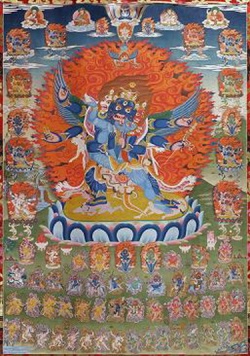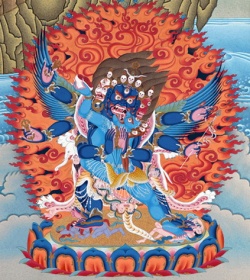Yang Nying Pudri
Yang Nying Pudri (Wyl. yang snying spu gri), the Razor of the Innermost Essence, a cycle of Vajrakilaya practices revealed as a terma by Tertön Sogyal. It is the main yidam practice of the Rigpa sangha.
Khenpo Jikphun said that the three main Vajrakilaya termas of Tertön Sogyal are Yang Sang Tröpa, which is very long, Yang Nying Pudri, which is of medium length, and Yang Zab Nyingpo, which is quite short.
The Revelation
Tertön Sogyal’s biography, which was written by Tulku Tsullo, describes how the terma was revealed. In the autumn of 1895, Tertön Sogyal went with Jamgön Kongtrul to Tsadra Rinchen Drak, a sacred site closely linked with both Jamgön Kongtrul and Chokgyur Dechen Lingpa, and one of the twenty-five holy places of east Tibet, representing ‘the wisdom mind of enlightened qualities’. There, high up on the hillside, Tertön Sogyal approached ‘The Cave that Delights the Awesome Heruka’ (Wyl. he ru ka dgyes pa'i sgrub phug), where, his biography recounts:
“The outline of the terma door stood out clearly in the rock face, and when he saw this, he became as if excited and flung a stone at it. At once the earth shook with a great crashing sound, as though a whole mountain was subsiding. An aperture in the rock gaped open, and an exquisite fragrance flooded out to fill the air. Tertön Sogyal plunged his hand into the opening and withdrew a kutsab—a representation of Guru Rinpoche—in a striding posture and gripping vajra and phurba, and along with it, the casket containing the terma of Yang Nying Pudri. Wrapping them carefully in silk so that no one might see, he placed them in the terma chest held by his consort. The terma trove in the rock was also full of amrita, but he said that it was not his to take and he would not remove it. However, his consort pleaded with him insistently, and to avoid disappointing her, he took some of this amrita, which liberates when tasted, and left the remaining treasure just as he had found it. He offered a substitute for the terma, and closed the door and sealed it well. Then Jamgön Kongtrul Rinpoche approached the site, and together, in joyful gratitude, they all celebrated a tsok feast, offered tormas to please the terma guardians, and made prayers of dedication and auspiciousness on a grand scale, aspiring to benefit the Dharma and all living beings.”
Lineage.
In 1898 Tertön Sogyal traveled to Lhasa to meet the Thirteenth Dalai Lama. His first, momentous, meeting with the Dalai Lama had been ten years earlier, when, it was said, “their wisdom minds instantly merged as one.” Now, following a proclamation of the Nechung Oracle, Tertön Sogyal offered the complete cycle of empowerment, transmission, and instruction of the Yang Nying Pudri to the Dalai Lama.
Early the next morning, the Dalai Lama records a vivid dream, in which he found himself before the palace of Guru Rinpoche, where he was met by two celestial beings, singing prophetic verses about this practice of Vajrakilaya. They told him that desire, anger, and ignorance would be eliminated, obstacles overcome and attainments realized, if he performed a thousand tsok offerings according to the Yang Nying Pudri practice. The Dalai Lama’s biography explains: “He awoke, remembering the words very clearly. The Dalai Lama and Lerab Lingpa then decoded their meaning together. And he accomplished the thousand tsok offerings of Vajrakilaya, as the prophecy made clear was the right thing to do.”
Tertön Sogyal then gave the Yang Nying Pudri empowerment to the monks of the Namgyal Monastery in the Potala Palace, who have maintained this practice ever since. In 1899 the mendrup was performed as part of the Mönlam Chenmo, the annual Great Prayer Festival at the New Year in Lhasa, and woodblocks for the entire cycle were carved. The Thirteenth Dalai Lama arranged the Yang Nying Pudri for practice as a drupchen and so composed the text Treasury of Wishes for the Benefit of Self and Others that was used by the Namgyal monks at Lerab Ling.
His Holiness the Fourteenth Dalai Lama:
"Yang Nying Pudri, The Razor of the Innermost Essence, was revealed by Lerab Lingpa, who was a great tertön, a discoverer of hidden treasures, during the time of the Thirteenth Dalai Lama. In fact, there was a very strong connection between Lerab Lingpa and the Thirteenth Dalai Lama. When this terma was revealed by Lerab Lingpa, it was prophesied to him that the Thirteenth Dalai Lama was to be the chödak, the custodian of these teachings. The task of the chödak was to receive the teachings from the tertön, and propagate them. This explains why the Thirteenth Dalai Lama composed the manual of liturgies that is used to perform the drupchen associated with the Yang Nying Pudri cycle. So there was a very strong and powerful connection between the Thirteenth Dalai Lama and the tertön Lerab Lingpa."
Kyabjé Dilgo Khyentse Rinpoche offered the empowerment of Yang Nying Pudri to His Holiness the Fourteenth Dalai Lama.
The Texts of the Yang Nying Pudri Cycle
The Sadhana
The druptrin (sgrub phrin) is the name for the longer version of the Yang Nying Pudri sadhana. The shorter one, the daily practice, is called the dön nying (don snying). According to Garje Khamtrul Rinpoche, during a retreat on Yang Nying Pudri, it was usual in Tibet to do the longer sadhana in the first session of the day, and the shorter one in the following three sessions.
Bylakuppe Edition
From the collected visionary revelations and textual rediscoveries (gter chos) of las-rab-glin-pa alias ñag-bla bsod-rgyal (1856-1926), Bylakuppe, 1985
volume pha
The Inventory: The Perfectly Clear Mirror (thems yig rab gsal me long) pp.1-7
The Profound Empowerment Ritual Clearly Arranged (bka' dbang zab mo lag len gsal bar bkod pa) pp.9-30
The Mandala Ritual (dkyil 'khor gyi cho ga) pp.31-57
The Descent of Blessings: 'Rainfall of Blessings' (byin 'bebs byin rlabs char 'bebs) pp.59-67
The Definitive Points of the Samaya: The Root of All Attainments (dam tshig gi gnas nges pa dngos grub kun gyi rtsa ba) pp.69-82
Profound Instruction on the View (lta ba'i khrid zab mo) pp.83-95
Practice Manual: The Net of Jewels (mngon rtogs rin chen drva ba don gyi snying po mthar thug) pp.97-155
Practice Guide for the Phases of Enlightened Activity of Vajrakilaya called 'Rainfall of Siddhis' (sgrub khog phrin las kyi rim pa dngos grub char 'bebs) pp.157-195
Mantras of the Ten Wrathful Ones (khro bcu'i sngags) p.197
Mantras of the Four Doorkeepers (sgo bzhi'i sngags dang gzhi snying bcas) p.198
Praise: The Swift Accomplishment of Activity (bstod pa phrin las myur 'grub) pp.199-209
The Tsok Feast: Samantabhadra's Clouds of Offerings (tshogs 'khor kun bzang mchod sprin) pp.211-231
Confession and Fulfilment: The Falling Rain of Siddhis (bskang bshags dngos grub char 'bebs) pp.233-245
gnad bskul gnam lcags thog mda' pp.247-264
[[gdab kha mtshon cha'i [khor lo phung byed dug gi spu gri]] pp.265-285
gtor bzlog gnam lcags spu gri pp.287-352
zor las gnam lcags thog mda' pp.353-366
Fire Offering: Accomplishing All the Enlightened Activity of the Four Types of Action (me mchod las bzhi'i phrin las kun 'grub) pp.367-375
The Sadhana of the Oath-bound Protectors called 'Wheel of Razors' (dam can sgrub thabs spu gri'i 'khor lo) pp.377-388
Life-Force Empowerment for the Oath-Bound Guardians: Secret Seal of the Heart (dam can gyi srog dbang gsang ba thugs kyi rgya can) pp.389-396
gtso sgrub gu ru'i thugs phur pp.397-410
mthar rgyas dbang bskur zab mo pp.411-425
The Ultimate Empowerment: The Essence of Nectar (don dbang bdud rtsi'i snying po) pp.427-438
The Essential Daily Practice of the Enlightened Activity of Vajrakilaya (phrin las rgyun khyer don gyi snying po) pp.439-462
The Ritual for the Great Accomplishment: The Treasury of the Twofold Benefit (sgrub chen gyi cho ga don gnyis 'dod rgu'i bang mdzod) by the Thirteenth Dalai Lama pp.463-582
thig tshon lha gnas bcas gsal bar bkod pa pp.583-593
Namgyal Edition
From rnam par rgyal ba'i phan bde legs bshad gling grva tshang gi 'don chog gter ston bsod rgyal dam las rab rab gling pa'i gter byon phur pa yang snying spu gri'i chog cha tshang thog kha bskong le tshan bcas, 1985
The Prayer of Inspiration known as "The Falling Rain of Blessings" (gsol 'debs byin rlabs char 'bebs) (from the Yang Zab Nyingpo) pp.5-8
sgrub khog phrin las kyi rim pa pp.9-45
don gyi snying po pp.47-69
tshogs mchod kun bzang mchod sprin pp.71-89
mngon rtogs rin chen drva ba pp.91-148
sgrub chen 'dod dgu'i bang mdzod composed by the Thirteenth Dalai Lama pp.149-263
bdud rtsi rtsa ba'i sman sgrub pp.265-291
dkyil chog pp.293-318
me mchod las bzhi'i phrin las kun 'grub pp.319-326
me spar cho ga p.327
don dbang bdud rtsi'i snying po pp.329-339
drag sngags pp.341-343
byin 'bebs byin rlabs myur 'gyogs (from the Yang Zab Nyingpo) pp.345-348
The Profound Purification Torma Preliminary (sngon 'gro gtsang gtor) (from the Yang Zab Nyingpo) pp.349-351
drag sngags so lnga pa p.353
khro bcu'i sngags p.355
bdud rtsi'i byin 'bebs pp.357-358
sri mnan pp.359-363
dam can sgrub thabs pp.365-375
gtor chog (from the Yang Zab Nyingpo) pp.377-399
gtor 'phen pp.401-423
[[rab [gnas]] pp.425-479
gu yangs sgrub pa pp.481-482
byin 'bebs byin rlabs char 'bebs pp.483-490
las byang 'khyer bde bkod pa bstan 'gro'i dge mtshan spel ba'i yid bzhin dbang rgyal pp.491-521
bskang bshags dngos grub char 'bebs pp.523-534
gnad bskul gnam lcags thog mda' pp.535-551
bstod pa phrin las myur 'grub pp.553-562
mngal gsol bsam don lhun grub pp.563-570
The empowerment has been given to the Rigpa sangha on several occasions, including:
Kyabjé Dilgo Khyentse Rinpoche, Prapoutel, 17th August 1990
Kyabjé Trulshik Rinpoche, Lerab Ling, Sunday 14th November 1999
His Holiness the Dalai Lama, Lerab Ling, 19th September 2000
Kyabjé Trulshik Rinpoche, Lerab Ling, Saturday 28th June 2003
Kyabje Trulshik Rinpoche, Kirchheim, 30th December 2003.
Kyabjé Trulshik Rinpoche, Lerab Ling, Thursday 8th December 2005

